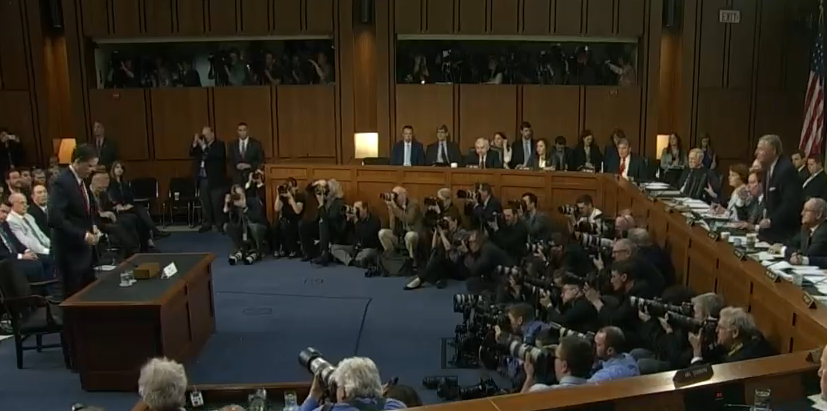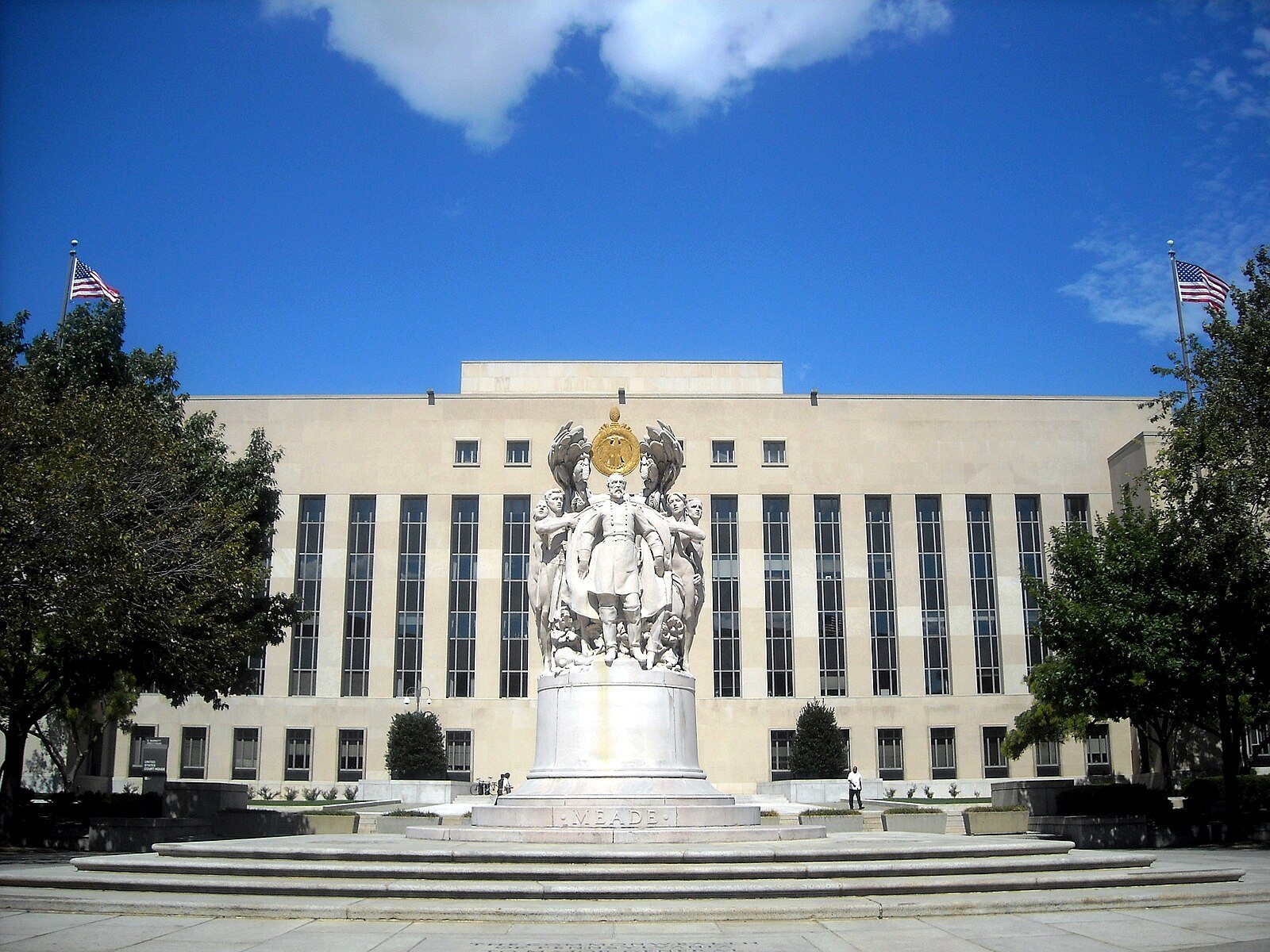The Rule of Law: Implications of the Comey Testimony and the Kasowitz Defense
Former FBI Director James Comey judged that the President lacked a basic integrity, and that he would have to document each of their conversations to protect himself and perhaps, too, to create a record for use in a future investigation. This was a striking and, of course, deeply disturbing conclusion, and the President and his lawyer have been quick to differ. But the moment that the FBI Director arrived at this conclusion, Mr.

Published by The Lawfare Institute
in Cooperation With

Former FBI Director James Comey judged that the President lacked a basic integrity, and that he would have to document each of their conversations to protect himself and perhaps, too, to create a record for use in a future investigation. This was a striking and, of course, deeply disturbing conclusion, and the President and his lawyer have been quick to differ. But the moment that the FBI Director arrived at this conclusion, Mr. Comey and others on the White House staff faced the question of what they could do about the President’s active interference in the law enforcement process.
Mr. Comey apparently concluded that, as he described it in his written testimony, this was an issue to be dealt with “down the road,” in an obstruction inquiry. He did not call the White House Counsel to warn him that the President was violating norms and courting major legal risk. According to both his written and oral testimony, he did advise the attorney general to always be in the room when the President meets with the FBI Director. He recalled an ambiguous response from the attorney general: no direct comment, but instead “body language” suggesting that attempts to enforce this requirement would be futile—“a sense like what am I going to do.” The attorney general denies this. At any rate, Comey did go not further: with the attorney general’s recusal a near certainty, and the deputy attorney general position then filled on an acting basis, he and his leadership team decided that the substance of the conversation should be “closely held.”
Taken as a whole, this account portrays an administration confronted with a grave issue—the President’s failure to observe norms and institutional boundaries—but no apparently effective process or implementation of norms for dealing with the potential for reoccurrences. Comey did what he thought necessary to protect “the investigative interest” arising from the President’s conduct. Meanwhile the danger for more of the same behavior from the President, on the Russian and other matters, was left unaddressed, as far as we know from the public record to date.
The institutional defenses against the breakdown of basic norms begin with an understanding among the key personnel of the government that their roles require them to cooperate in upholding these norms. Did the attorney general, following the concerns Comey expressed, contact either the White House Counsel or the White House Chief of Staff? The attorney general and the chief of staff were aware that the President had cleared the room; now they knew that it was an issue of concern to the Director of the FBI. Was Mr. Comey’s admonition relayed to the President? Comey elected not to present his objection directly to the President; if the chief of staff, the attorney general, and the White House counsel all passed on engagement with the President over the issue, then four senior officials of the government may have determined that it would be pointless, to no effect.
The steps taken, or not, within the White House in the aftermath of the Comey meeting are a matter of high interest because the President repeated this conduct. What he did with Comey—clearing the room and raising an ongoing investigation—he did again with the chiefs of two intelligence agencies. The Comey encounter took place on February 14; the discussion with ODNI Director Dan Coats and NSA Director Admiral Michael Rogers occurred one month later. The same questions can be asked: did anyone in a position of responsibility act in concert with others to learn what the President said in this meeting, and to confer on measures to affirm and enforce norms?
It is always possible that following the Comey meeting, the issue was duly raised with the President who had no use for the advice. Then the attorney general, if Comey understood him correctly, would have rightly predicted the futility of an intervention. The President’s obduracy can only add to alarm over the state of the norms and the overall attentiveness to the rule of law in this administration. It also worsens the President’s legal position. If advised not to interfere in the law enforcement process and yet choosing to push ahead anyway, then Mr. Trump has made himself more vulnerable on the critical question of “intent” in the obstruction inquiry. He would have had notice and disregarded it, which would be evidence that the personal interests he was protecting mattered to him more than preserving the norms necessary to safeguard the integrity of the investigation. In the course of the investigation, prosecutors would likely have access to this evidence—evidence bearing on "intent"—and the capacity to navigate the issues of privilege. The subject would certainly come up in the interview the President has now publicly offered to Mr. Mueller.
Mr. Kasowitz’s arrival on the scene presents fresh risks to these rule-of-law considerations. A private lawyer and citizen, he is now speaking and acting for the President on what is both a personal and an official matter, the Russia-related inquiries, as he did after the Thursday hearing. As noted here, his activities bring to the surface and heighten the underlying conflict between the President’s private interests and his public responsibilities. The President disputes the essential premise of the investigation—a Russian intervention in support of his campaign that he has scorned as “made up.” It is in his interest to argue this case because, if he downplays the Russian activities, he relieves some of the pressure on him and his legal interests from questions about campaign’s “collusive” behavior. Yet as President, he has a high official duty to do a thorough investigation of a major—in its way unprecedented—national security risk. Mr. Kasowitz’ involvement in questions like the invocation of privilege to block government witness testimony exposes and aggravates this conflict.
In the last 48 hours, first Mr. Kasowitz, seconded by a presidential tweet, accused Mr. Comey, a key congressional and law enforcement witness, of misconduct in the leaking of his memos. Mr. Kasowitz is also reportedly preparing a complaint to the Department of Justice on the leaks. It is important not to overlook the implications of this move by the President’s defense counsel: he is asking the very Department that answers to the President to take action against a witness in a legal matter involving Mr. Trump’s personal interests. There can be seen here, again, the flouting of the line between official and personal interest.
The New York Times now reports that Mr. Kasowitz may have been still more aggressive in challenging that line. Sources tell the Times that, without establishing an appropriate process in coordination with the White House Counsel, the President’s private lawyer has begun discussing the case with White House aides. Those discussions may have included his suggestion that it was premature for these staff members to consider the hiring of private lawyers. A spokesman for Mr. Kasowitz has disputed this account, stating: “Of course people are free to hire a lawyer or talk to anyone they want.” This is not a clear or express denial that Mr. Kasowitz is proceeding on his own to have these discussions without the involvement of the White House Counsel. It also not sufficient for Mr. Kasowitz to acknowledge the entirely obvious right of “people…to hire a lawyer.” The question is whether he might have discouraged them from doing so.
Moreover, in the last days, the President and his lawyer have seemed to collaborate in putting out strident public messages critical of Mr. Comey’s testimony and conduct. As easy as it may be to become accustomed to the President’s love of the tweet, the president’s use of social media to call a witness out for being a liar and a coward is an escalation in the context of the Russia investigation. We cannot know, but there is no reason to believe that Mr. Kasowitz objected to these tweets. The statement he issued is also a strong, parallel attack on Comey, and it contains the same suggestion, though more muted than the President’s, that Comey lied. A public campaign against Comey, orchestrated or approved by private counsel, could well serve as a message to other witnesses to be careful about what they say. Large companies accused of unpatriotic outsourcing did not care for being singled out in an abusive tweet, and they did what they could to stay out of the line of fire. Individuals now in the middle of the President’s Russian troubles may not like it any more or do any less to escape the assaults by tweet.
The White House and the Department of Justice may be going through a major breakdown in the observation of the disciplines essential to separating public from private interest and to the observation of norms on which the rule of law depends. Those officials in a position to do something about it may be unwilling or unable to act. It is certain that, whatever the reason, they have been ineffective. Now Trump has his private lawyer at his side and in the thick of things in the West Wing, and the outlook for regular legal order is not improving.


.jpg?sfvrsn=407c2736_6)


